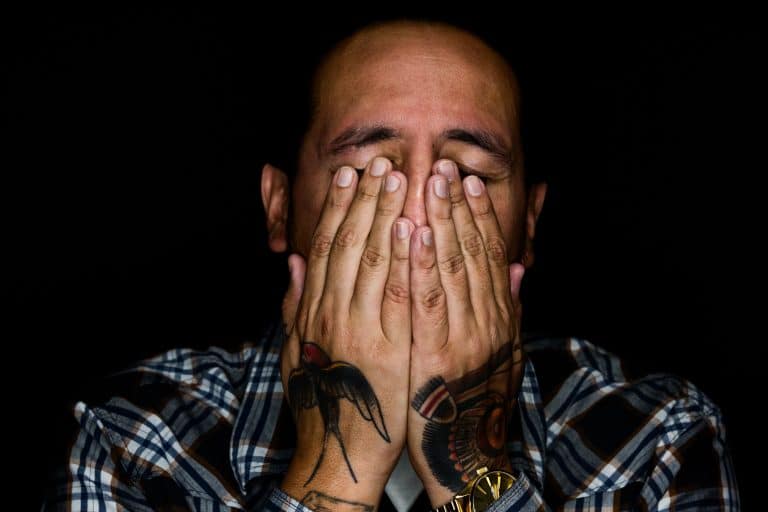
Image by Ayo Ogunseinde/Unsplash, Public Domain Dedication (CC0).
For Guys Reading #MeToo Testimonies
First, read the #metoo stories on your Facebook or Twitter feed.
Read about the bosses and teachers and neighbors and friends who have sexually harassed and assaulted the people you know and maybe even love. Pay special attention to the stories. You will see patterns. You will shudder at the abuses of power. You might even feel sick to your stomach. Then immediately…
Do nothing.
Sit in silence. Don’t say anything. Don’t retweet anything. Don’t text anyone. Just sit there. Maybe even close your eyes. Feel what you feel.
I’m guessing underneath the surprise and the anger (anger is easy), there is a deep well of sadness that you live in a world where women are treated this way. Like objects. Subhuman. Sexual decoration.
Feel the sadness of living in a world like this.
If you are capable, and even if you aren’t sure you are, feel the sadness of being a part of the group of people that has most violently and repeatedly created and maintained a world like this. Feel the excruciating pain of complicity.
Don’t soothe it with thoughts of your own exceptionalism. Don’t jump to perform your love of women. Don’t talk about your mother or your sister or daughter. Just sit. Feel the feelings.
You honor the pain that has been expressed so courageously by giving yourself over to the discomfort of actually feeling what it is to live in this world — a world filled with sexual harassment and assault — as a man. Sitting with that discomfort will change you. And the changed you can then take action with a different kind of wisdom.
I’m asking you to do this because it is similar to the discomfort and wiser action I am striving for with regard to my whiteness. In other words, I know it isn’t easy. I’m trying to do this myself — trying to actually feel the grief and unpack the privileges that produce surprise in me when a group of white supremacists takes to the streets in Charlottesville in 2017. I want nothing to do with them, but they are part of me. We share the same skin color. We share a country. We share a horrifying and unhealed history.
So you, my guy friend — if you are moved by the courage of the testimony you are reading, you must dig in and meet that courage with stillness and softness. Don’t be good or right. Don’t distance yourself from the possibility of violation and violence. Move closer to your own confusion and earnest desire to understand the sickness at the center of contemporary masculinity, a bit of which, at least a bit of which, you, too, are suffering from.
Reflect on how it might be showing up in your home, in your workplace, in your school. Not just as harassment or assault — as arrogance, as obliviousness, as narcissism, as domination. Consider journaling. Consider reading. Consider therapy. If you think you’ve figured it out, if you are tempted to explain it, start over. Get really, really humble. This is going to take a long time. A lifetime. Learn how to notice your emotions before you fling them out into the world in some other form. Reclaim the child you were before they told you how to be a man. Remember his tenderness, his curiosity, his wholeness. Realize that your liberation is tied up in ours.
Then, and only then, gather with other men and have incredibly awkward conversations about the feelings that are arising in this moment, in these explorations. Model what it looks like to say hard things in front of other dudes. Be earnest even when you’d rather make a joke. Don’t get trashed while you do it. Try to stay sober and look other guys in the eye. Teach each other how to call other men out when they are belittling and overlooking and harassing and abusing other women (and other men).
Don’t do this for your daughters and wives and mothers. Do this for your sons. Do this for yourselves. Don’t use an apologetic tone in a women’s studies class; use an unapologetic tone at the bus stop or at your book club or around the Thanksgiving dinner table, or yes, on Facebook. Take it personally, together. Consider it urgent, together. One of the delusions that privileged people often have is that we can fix things, efficiently and alone. Know this: you cannot fix this. The journey will not be efficient. You cannot go it alone.
A world this riddled with sexual harassment and abuse will never be healed by a hashtag, that’s for sure. Yet, this moment could be the first one that you choose to do something different, to lay the first brick in a world that is built differently, a world safe for women’s bodies and men’s feelings, a world worthy of everyone’s wholeness.
